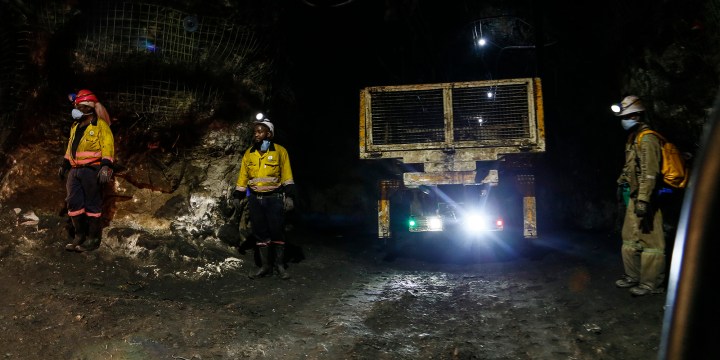
Employees near an underground mining truck at the South Deep Gold mine on 12 October 2022, located west of Johannesburg in Gauteng. (Photo: Felix Dlangamandla)
By Ed Stoddard
02 Mar 2023
Global mining exploration budgets rose in 2022, with the scramble for ‘green metals’ such as lithium leading the pack in terms of growth. This is according to S&P Global’s World Exploration Trends 2023 report. Pointedly, it makes absolutely no mention of South Africa, which remains off the radar.
Around five years ago, an exploration company drilled in the US state of Nevada and hit pay dirt.
In January 2022, JSE-listed AngloGold Ashanti completed its acquisition of Corvus Gold in the Beatty district of southern Nevada where the find was made, giving it a low-cost, long-life production base that includes 4.2 million ounces of extractable gold at its Silicon deposit, for a total of 8.4 million ounces, with significant potential for future growth.
What’s intriguing on this front is that one would have thought the US West was a heavily explored region with little to offer in the way of rich, new deposits. The California Gold Rush took place in the mid-19th century and America became the world’s leading industrial power, first through the exploitation of its own natural resources.
In an interview with Business Maverick after the release of the company’s annual results last month, AngloGold CEO Alberto Calderon said that thought had also crossed his mind:
“I asked, how were we able to acquire this? And I’m not going to tell you names, but I know that since we are in that territory, very large competitors of ours have returned and are saying, ‘what the hell did those guys find over there?’” Calderon said.
“We are going to build a multidecade, really significant operation over there.
“Because it had been explored, I actually visited the site, and the competitors that are back had been very close, and this is the story of exploration and geologists. And they just did not look in the right place. And then there was this very smart company that five years ago drilled in the right place, and then they contacted our exploration team, and our exploration team took over,” he said.
That’s the name of the exploration game: you can hit a mother lode or nada, and close means no cigar. The bottom line is that a lot of the world’s mineral and metal wealth remains untapped and unknown.
This includes a heavily explored jurisdiction such as the US, which in 2023 achieved its highest ranking yet – 4th – on S&P Global’s World Exploration Trends 2023 report, an annual analysis of exploration data that began in 1997. “Gold remained the exploration target of choice, accounting for over half of the region’s budget at $881.6-million,” the report, released this week, said.
Global exploration budgets rose 16% in 2022 on top of a 34% rebound in 2021 following the hard lockdowns to contain the pandemic in 2020.
“After budgets fell 10% year over year to $8.35-billion in 2020 due to the Covid shock, nonferrous global exploration budgets hit a nine-year high of $13.01-billion in 2022,” the report says.
“Nonferrous” effectively means all metals that do not include significant amounts of iron.
“… nonferrous global exploration budgets hit a nine-year high of $13.01-billion in 2022. The increase was driven by escalating interest in the global energy transition as part of global decarbonisation efforts and by the ongoing pandemic recovery, and was supported by strong metals prices and healthy financing conditions.
“While allocations for most commodities increased in 2022, budgets for gold and copper posted the largest dollar increases, while energy transition efforts saw lithium increase to its highest total ever.”

Visit Daily Maverick’s home page for more news, analysis and investigations
A number of factors are at play here. Gold producers need to “replace” the ounces they mine – either through exploration or acquisitions – or else they eventually go out of business, and gold remains a big business.
This also applies more widely to the sector. And in the cases of copper and lithium, both are seen as “green metals” crucial to decarbonisation efforts and the green energy transition in the face of rapid climate change linked to greenhouse gas emissions from fossil fuels.
It’s also interesting to note how the report defines a “region”.
“We define Canada, Australia and the United States as regions as well as countries, due to their size and significance to the mining industry and the fact that they consistently account for around half of the global exploration budget,” it says.
The “Big Four” regions for exploration are Latin America, Canada, Australia and now, for the first time since the survey began in 1997, the US. Exploration budgets among the four amounted to almost $10-billion last year.
Which brings us to Africa, where export allocations only rose by 11.6% – “the second year in a row the region has underperformed the global average”.
Gold accounted for over half of the region’s exploration capital in 2022, while copper, diamonds and lithium posted the strongest percentage increases.
“Mali was the top exploration destination in Africa for the first time … with a 19.1% increase in 2022,” the report said.
And what about South Africa?
One would have presumed not so long ago – not even a fraction of a blink in geological time – that South Africa would surely be counted as a “region” on its own on this front. South Africa still has mineral wealth galore.
About 70% of the world’s known platinum reserves and 80% of the manganese are found here.
South Africa now ranks barely in the top 10 among the world’s top gold producers, but about a third of the precious metal that has been produced in history was pulled from the earth here, and mountains of the stuff remain buried deep underground. There’s also lots of coal, plenty of iron ore, a few diamond deposits and so on.
And the Northern Cape, if you think about it, is a lot like Nevada, even if Springbok is not exactly Vegas. It is big, arid and sparsely populated, and is widely believed to have lots of undiscovered mineral wealth, including copper.
Yet South Africa does not merit even a single mention in the report – as revealed in a word search of the document. It is simply not on the exploration radar screen, and it’s not because its geology has been so thoroughly scrutinised.
This surely stands among a long list of examples that underscore how the government – notably the Department of Mineral Resources and Energy (DMRE) – has rendered South Africa a no-go zone for exploration and mining investment.
Mali, by the way, has challenges of its own. A brutal insurgency by militant Islamists comes to mind. But it’s way ahead of South Africa when it comes to exploration investment.
In June 2019, DMRE Minister Gwede Mantashe laid down the following target for South Africa’s exploration sector:
“Integral to investment attraction, the Council for Geoscience’s mapping programme is critical to identify and affirm new mineralisation systems… The programme aims to secure a minimum of 5% of the global exploration budget within the next three to five years.”
Here’s a hint: whenever Mantashe publicly sets a target date for the mining industry or for his own department, add some geological time. The S&P Global report does not provide the latest estimate – at least in the document made available to journalists – but no surprise given that South Africa is not even mentioned.
But the latest estimates from 2021 suggest it remains below 1%, so almost four years after Mantashe threw out the 5% minimum goal – minimum, nogal – within three to five years, it’s not even close.
The reasons for this deplorable state of affairs are well known: crippling power shortages, rising levels of social unrest (see first factor), Transnet’s woes, the rise of procurement mafias and their penchant for murdering mining executives, policy uncertainty, and the DMRE’s inability to get anything done that might actually help to attract investment.
For exploration, South Africa’s lack of a functioning mining cadastre that provides gin-clear clarity to the state of play of mining and prospecting rights and the country’s geological resources is seen as one of the key obstacles to investment.
Yet the DMRE, as we have extensively reported, has dithered for years on the issue, and it will likely take at least another year before one is in place – and who knows, the end product may not provide the level of transparency provided by the cadastral systems used by neighbouring Namibia, Botswana and Mozambique.
Read more in Daily Maverick: “Another day, another mining cadastre procurement delay”
Returning to AngloGold, what kind of exploration has it done of late in its home base? Well, only the search for a new property for its company HQ in Rosebank, as it joined the exodus of mining companies out of the Johannesburg CBD.
In 2020, AngloGold sold off the last of its operational assets in South Africa to Harmony Gold while hightailing it out of Dodge.
So, will South Africa rate a mention in next year’s World Exploration Trends report? Here’s a safe timeline target: almost certainly not. DM/BM










